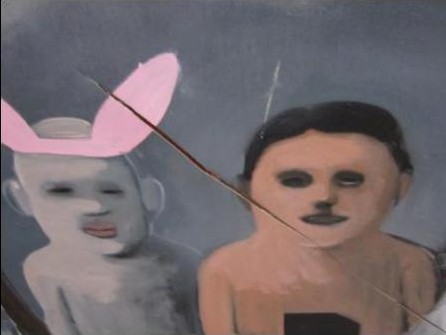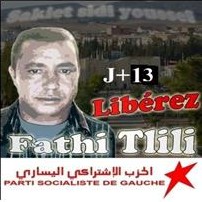Index relies entirely on the support of donors and readers to do its work.
Help us keep amplifying censored voices today.
Tunisian radio journalist Nadia Heddaoui Mabkhout was denied access to the headquarters of RTCI (Radio Tunis Chaîne Internationale), suspended from work and had her radio show cancelled last Friday.
Mabkhout was on her way to host her show Café Noir, recently renamed L’invité du Journal, which is aired on Monday, Wednesday, and Friday from 8:30 to 9am. She was accompanied by her guest, Neziha Rejiba (alias Om Zied), a well-known Tunisian activist and writer. (more…)
The Monastir appeal court has upheld a primary verdict in Tunisia’s Muhammad cartoon case.
In March, Jabeur Mejri and Ghazi Beji were sentenced to 7-and-a-half years in prison over the publishing of caricatures of the prophet Muhammad , and books criticising Islam. Mejri appealed the verdict, but Beji, who was sentenced in absentia fled to Europe.
Defence lawyer Ahmed Msalmi described today’s ruling as “severe”, and “incompatible with human rights”. “Such a severe verdict can be considered a form of torture,” Mslami told AFP.
“The defendant suffers from behaviour disorders, and there are also social conditions that need to be take into account”, he added.
The court had previously refused the defence team’s request to examine Mejri’s mental state.
The Tunis Printemps des Arts (Spring of Arts), a modern contemporary art fair, ended on 10 June after 10 days of exhibitions and competition. The closing ceremony, which was supposed to be a celebration of art, was characterised by controversy, censorship and violence.
One of the artworks in question illustrates a naked woman, whose intimate parts are covered by a Couscous plate (a popular Tunisian dish). The woman is surrounded by dark, bearded men. The second work illustrates a bearded superman carrying another bearded man in his arms.
“They said that they would come back at 6 pm, and that they would rather not find the paintings,” said Aicha Gorgi, a gallery owner and artist. “They did come back at 6pm, their number grew, and they gathered in front of Palais El-Abdelia,” she added.
Police interfered to prevent any clashes between the artists and the ultra-conservative group. But later on in the night and after the closure of the art gallery, the ultra-conservatives came back in larger numbers and succeeded in invading El-Abdelia art gallery. They burned and destroyed a number of artworks.

“Police did not allow them to enter, but they climbed over the rear walls and entered the gallery,” Gorgi said in a testimony given to Radio Mosaïque FM. “They burned the work of Faten Gaddass, and tore to pieces two linen artworks, one by Mohamed Ben Slama, and the second by a French artist. At my stand, I also found Aicha Filali’s work destroyed.”
This is not the only censorship story which characterised this year’s Printemps Des Arts edition. Last week, young Tunisian artist Elektro Jaye claimed that the state put pressure on the fair’s organisers to take down his work.

13 days after police arrested him, Fathi Tlili, a coordinator for the Leftist Socialist Party (Le Parti socialiste de gauche in French), is still behind bars.
The arrest followed Tlili’s participation in protests which swept Sakiet Sidi Youssef, a small and underprivileged town in the northwest of Tunisia. On 25 May, the town’s inhabitants organised a general strike demanding employment and a local development boost.
The strike, which paralysed the town’s little economic activity, ended in acts of vandalism when unemployed protesters set official buildings and state-owned cars on fire.
Police are accusing Tlili of “inciting riot”, and of “breaking down” the local delegation’s rear door building. The PSG has denied these charges, claiming that Tlili and other party activists tried to stand up to acts of vandalism.
In a communiqué released on 3 June, PSG Secretary General Mohamed Kilani described the legal proceedings against Tlili as “a political trial”. He claims Tlili was badly treated while in prison.
“After visiting him in prison, Fathi’s wife asserted that her husband was physically abused, and badly treated. She noticed the bruises on his body,” the communiqué stated.
The Tunisian extreme left is often blamed for fuelling protests and social unrest. I an interview given to Al-Jazeera last January, Tunisian President Moncef Marzouki accused the “extreme left” of “manipulating, and politicising social protests in order to stir up trouble”.